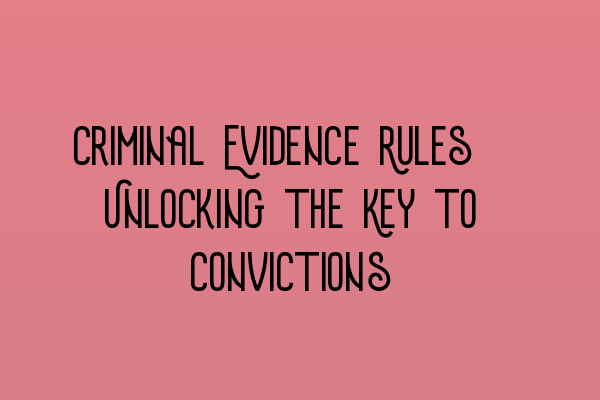Criminal Evidence Rules: Unlocking the Key to Convictions
Welcome to the SQE Criminal Law & Practice Law UK blog! In today’s post, we will delve into the important topic of criminal evidence rules and how they play a vital role in unlocking the key to convictions. Understanding these rules is crucial for legal practitioners, both aspiring and seasoned, as they navigate the complex world of criminal law.
Before we dive deeper, make sure to check out our related articles for further insights:
- Workshops and Seminars on Criminal Practice: Expanding Your Expertise
- Updates in UK Criminal Laws: Staying Informed and Prepared
- Enhancing Your SQE Criminal Law Study Group Experience
- Decoding Criminal Evidence Rules: A Detailed Analysis
- Ensuring Rights of Victims in Criminal Procedures: Legal Protections and Support
The Importance of Criminal Evidence Rules
Criminal evidence rules serve as the cornerstone of our justice system. They provide guidelines and procedures that enable courts to determine the admissibility and weight of evidence presented during criminal trials. These rules ensure that the evidence used to support a conviction is reliable, relevant, and obtained lawfully.
Understanding the intricacies of these rules is not only beneficial for legal professionals but also for those who are interested in the field of criminal law. Whether you are a law student, an aspiring barrister, or a solicitor, familiarizing yourself with criminal evidence rules will enhance your understanding of the legal principles that govern the admissibility of evidence in criminal proceedings.
The Key to Convictions: Admissible and Persuasive Evidence
In order to secure a conviction, it is essential for the prosecution to present admissible and persuasive evidence that proves the guilt of the accused beyond a reasonable doubt. Criminal evidence rules play a crucial role in determining the admissibility of evidence, ensuring that only reliable and relevant evidence is presented in court.
Admissible evidence refers to evidence that is legally relevant and reliable. It must meet certain criteria, such as being obtained lawfully and not being subject to certain privileges or immunities. The rules surrounding admissible evidence prevent the introduction of tainted or unreliable evidence into criminal proceedings, safeguarding the fairness and integrity of the trial process.
Persuasive evidence, on the other hand, refers to evidence that convinces the jury or judge of the accused’s guilt. The presentation and evaluation of evidence in court heavily rely on criminal evidence rules, as they guide legal professionals in effectively presenting their case and challenging the evidence presented by the opposing side.
Understanding the Rules: A Pathway to Success
Now that we have highlighted the significance of criminal evidence rules, it is important to understand the key principles that govern these rules.
One such principle is the admissibility of evidence. Evidence must be relevant, meaning it logically tends to prove or disprove a fact in issue. Irrelevant evidence is generally inadmissible. However, there are exceptions to this rule, such as when evidence is admissible to prove motive, knowledge, or intent.
The exclusionary rule is another important aspect of criminal evidence rules. This rule prohibits the use of evidence obtained through illegal means, such as unconstitutional searches or seizures. The aim of this rule is to deter improper police conduct and protect the rights of individuals against unreasonable searches and seizures.
In addition, the hearsay rule is a fundamental principle in criminal evidence. Hearsay refers to statements made outside of court that are offered as evidence to prove the truth of the matter asserted. Generally, hearsay is considered unreliable and is inadmissible. However, there are exceptions to this rule, such as when the statement falls under a recognized exception or when it is offered for a non-hearsay purpose.
These are just a few examples of the complex and nuanced rules that govern criminal evidence. Familiarizing yourself with these rules through workshops, seminars, or study groups, such as those mentioned in our related articles, can greatly enhance your expertise in criminal practice.
Conclusion
In conclusion, criminal evidence rules form the bedrock of our justice system. Understanding and applying these rules is crucial for legal professionals involved in criminal law, as well as individuals who have a passion for justice. By unlocking the key to convictions through the proper handling and presentation of admissible and persuasive evidence, we can secure justice and maintain the integrity of our legal system.
Stay informed and prepared by checking out our related articles:
- Workshops and Seminars on Criminal Practice: Expanding Your Expertise
- Updates in UK Criminal Laws: Staying Informed and Prepared
- Enhancing Your SQE Criminal Law Study Group Experience
- Decoding Criminal Evidence Rules: A Detailed Analysis
- Ensuring Rights of Victims in Criminal Procedures: Legal Protections and Support
Thank you for reading! We hope this article has provided valuable insights into the world of criminal evidence rules.
